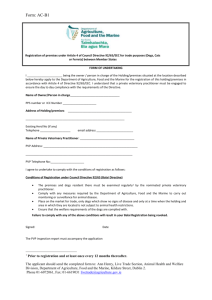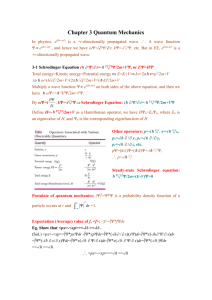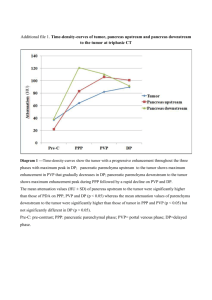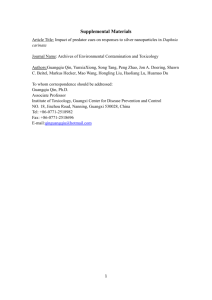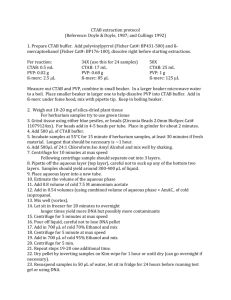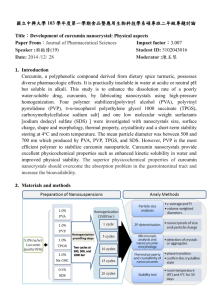Protocol for the assessment and quality control of Private Veterinary
advertisement
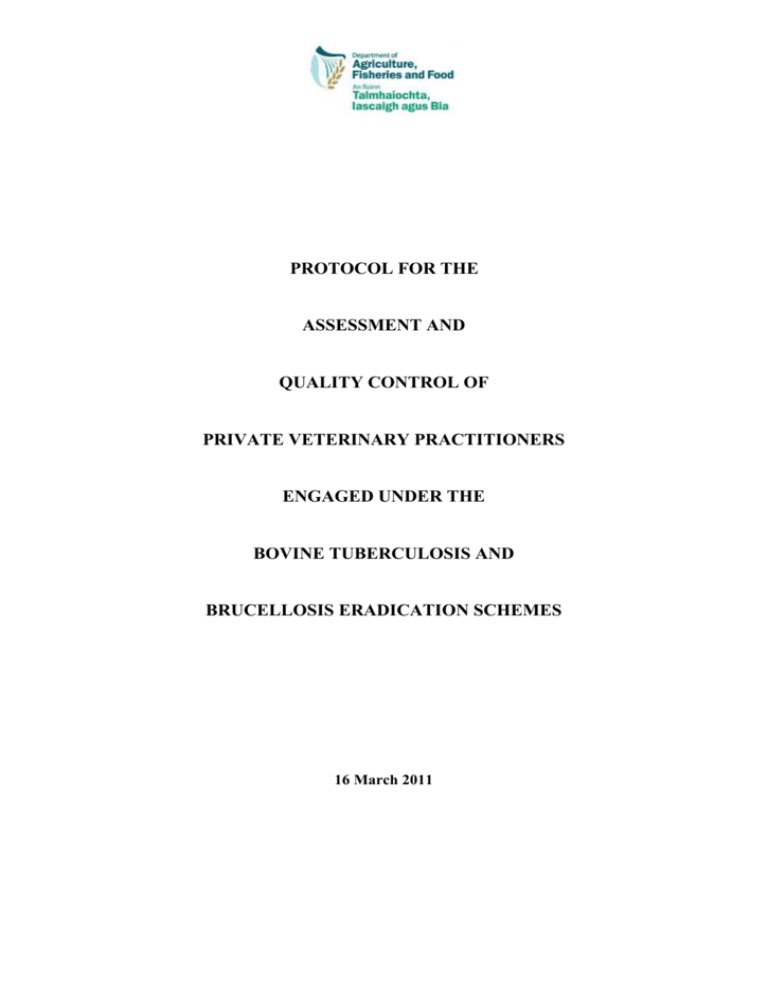
PROTOCOL FOR THE ASSESSMENT AND QUALITY CONTROL OF PRIVATE VETERINARY PRACTITIONERS ENGAGED UNDER THE BOVINE TUBERCULOSIS AND BRUCELLOSIS ERADICATION SCHEMES 16 March 2011 1. Introduction The Department of Agriculture, Fisheries and Food is responsible for developing and implementing the Bovine Tuberculosis (bTB) and Brucellosis national disease eradication programmes to maintain Ireland’s intra Community trading status and to progressively reduce the prevalence of these zoonotic diseases. In addition, the Department is responsible for the implementation of a programme to ensure maintenance of Ireland’s officially brucellosis free (OBF) status. The veterinary profession plays an indispensable role in ensuring the programmes are delivered to the highest standards. Delivery of a quality service to both farmer clients and the Department comprises of the correct application of the field test for bTB, sampling for Brucellosis, and implementation of efficient and effective administrative and reporting procedures. This document revises and clarifies certain aspects of quality control procedures for the benefit of Private Veterinary Practitioners (PVPs) in delivering the eradication programmes and replaces all earlier versions. The following elements are fundamental in the delivery of an effective and efficient service by PVPs – a) The Animal Health Computer System (AHCS) which has streamlined the rapid and accurate on line transfer of information to and from veterinary practices. b) The official training course for veterinary practitioners in carrying out SICTT (Single Intradermal Comparative Tuberculin Test) for TB and sampling for Brucellosis. c) Compliance with the conditions of the contract as set down in ER 67 and the ER4. The Department also continues to recognise the need for: a) Enhanced clarity and transparency in relation to the level of service delivery expected of PVPs, and b) clear and fair procedures in the event of issues with respect to compromised delivery. 2. Terms and Conditions for the participation of PVPs in the Eradication Schemes The approved PVP shall at all times (i) comply with the Conditions of Contract as set down in document ER 68 and (ii) conduct TB testing and Brucellosis sampling in accordance with the most recent ER4 (Annual official testing instructions) document in force at the time. 3. Monitoring of the quality of TB testing and Brucellosis sampling During the course of visits to veterinary practices in their area of responsibility, DVO Veterinary Inspectors will discuss such items as the annual testing programme and the level of service expected of the practice in that respect. The veterinary inspector will also examine the equipment and related computer software to be used in the field and at the practice office for testing/sampling, including tuberculin storage and stock control procedures. Periodic information meetings may also be organised by the area SVI. It shall be a condition for approval to test/sample that, prior to the annual testing programme, a declaration that the ER4 testing instructions document has been received, read, understood and will be observed, must be received from each approved PVP. In addition, in order to qualify for approval, each practitioner must submit certificates of purchase or servicing of a pair of McLintock syringes each year. The testing performance and outcome profiles will be monitored by the local DVO under the direction of senior Regional and Headquarters veterinary staff. This aims to ensure the consistent application of uniform standards across the country, to function as a safeguard in relation to the maintenance of high standards and to ensure that PVPs are treated fairly and equitably. The local DVO will carry out regular monitoring of PVP testing technique and performance using a combination of administrative checks on PVP performance, based on analysis of testing data, and supervisory field inspections carried out by a Veterinary Inspector (VI). Administrative checks The DVO will routinely analyse testing data and monitor administrative procedures for each PVP quarterly and annually. Administrative criteria to be considered include the following: 1. Syringe Certification. (Mandatory) 2. Declaration relating to ER4 Testing Instructions. (Mandatory) 3. Submission of advanced itinerary in the prescribed timeframe and receipt of DVO approval prior to conducting any test. (Mandatory) 4. Notification of reactors and submission of test reports within prescribed timescales. (Mandatory) 5. Incidence of positive test reactions recorded. 6. Test results in comparison with area test results. 3 7. Rate of submission of amendments to certification of test reports. 8. TB Positive lesions detected in recently tested non-reactor animals. 9. Test failures (SICTT post-movement or otherwise) in recently tested animals. 10. Entry of test details such as date stamping, entry of herd number and signature of PVP on passports. (Monitored routinely at marts, export points and slaughter plants). Supervisory Field Inspections Supervisory field inspections will take place on a risk, random and opportunistic basis. The frequency of supervisions in respect of individual practices will ordinarily be determined by its record of compliance with quality control criteria. The following areas will be examined in the context of the performance of SICTT/sampling in the field: 1. Equipment: (All Mandatory) (a) Properly functioning and properly identified syringes. (b) Properly functioning callipers, surgical spirits and cotton wool. (c) Properly functioning scissors/clipping device, taggers, temporary ID tags, reactor tags and disks. (d) Thermometer and stethoscope. (e) Spare syringe, needles, needle adaptors etc. (f) Sufficient supply of Tuberculin, blood sampling tubes, labels and needles. (g) Approved software on hand held computers/field book. 2. Procedure: (All Mandatory) (a) Disinfection of protective footwear/clothing on arrival and departure. (b) Recording details of all animals presented for test (CCP). (c) Testing of properly identified animals only (CCP). (d) Siting of injections (CCP). (e) Clipping of injection sites (CCP). (f) Measurement and recording of skin thickness at sites pre-injection (CCP). (g) Intradermal injection of tuberculin – production of “pea” (CCP). (h) Collection of animal passports. (i) Palpation, measurement and recording the skin measurement at each injection site at 72 hours for each animal tested (CCP). (See Section 1.A.8 Appendix 1 ). (j) Correlation of blood samples with tag numbers at the time of sampling (CCP). 4 (k) New needle for each blood sample. *While all elements listed above are essential, criteria marked CCP (critical control points) are distinguished from other criteria in relation to the validity of the test and the corrective measures that may be applied in the event of non-compliance. 4. Corrective measures in the event of breaches identified as a result of Administrative checks (ER13 A Breaches) The categorisation of the seriousness of breaches of administrative procedures is set out at Sections 1(A) and 2(A) of Appendix 1. (a) Serious Administrative Breaches (Section 1(A) of Appendix 1) Serious breaches that compromise the validity of the TB/Br test will be subject to sanctions and procedures set out in Sections 6 and 8 below. Serious breaches that do not compromise the validity of the test will be subject to the sanctions and procedure set out at Sections 7 and 8 below. In addition, where the PVP commits a serious administrative breach(es) as defined at Paragraph 1(A) of Appendix 1, he/she will be required to reimburse DAFF for expenses arising from any additional or consequent official controls as set out in the ER4 document. Depending on the seriousness of the breach and/or the validity of certification consideration will also be given to invalidation of tests, withdrawal of test listings and/or approval to conduct testing/sampling. (b) Administrative Breaches of a less serious nature (Section 2(A) of Appendix 1) Moderate breaches that do not compromise the validity of tests will be subject to corrective action as in Section 7 below. Failure to remedy identified deficiencies and/or repeat breaches under this heading may be treated as a serious breach and will be dealt with in accordance with section 8 below. The SVI/HEO will notify the PVP, in writing, of the breach(es) and request an undertaking to implement remedial actions and to comply with the official testing instructions. The letter will also inform the PVP that any recurrence of the breach in question may lead to a requirement for further training at the PVP’s expense or the withdrawal/reallocation of testing. The follow up disciplinary action taken, including additional administrative checks, further supervisory checks will reflect the gravity of the findings in the report. 5 5. Corrective measures in the event of unsatisfactory Supervisory Field Inspection reports The categorisation of the seriousness of breaches of field testing procedures is set out in Sections 1(B), 2(B) and 2(C) of Appendix 1. The supervising Veterinary Inspector will complete the standardised report form ER13 immediately on conclusion of each field inspection and give a copy to the PVP and invite comment by the PVP which can be made on page 2 beneath the sample signature. Where breaches have been identified, the report will include an indication of whether a verbal warning was issued by the VI to the PVP and the nature of the breach(es). Unsatisfactory reports will be recorded as “fail” or “inconclusive” on the AHCS, based on the decision of the SVI, who will review the report in consultation with the inspecting VI and take account of any submissions made by the PVP following the supervision. The SVI will also communicate follow-up action to the PVP. The supervisory field inspection may uncover breaches that fall into two categories as follows: A. Serious breaches that compromise the validity of the TB/Br test will always incur a “fail” supervision report. B. Moderate breaches that do not compromise the validity of these tests will ordinarily be recorded as an “inconclusive” report. However recurrence of such breaches may lead to a “fail” report. The follow up action, including disciplinary action if appropriate, taken will reflect the gravity of the findings in the report. 6. Breaches that compromise the validity of the BR/TB test and consequential certification of the result The identification of such breaches may lead to any or all of the following: - Invalidation of the test, - Immediate suspension or withdrawal of approval to test or sample (at and from the time of the inspection), - A decision to suspend or withdraw approval to test or sample from a future date. 6 A decision to invalidate the test and/or to immediately suspend or withdraw approval to test or sample may be taken by the supervising VI, where possible in consultation with the SVI, at the time of the inspection. In addition, where no decision is taken at the time of the inspection to invalidate the test or to suspend/withdraw approval to test/sample, the SVI may, based on a report by the inspecting VI, decide that the breach warrants such action, where possible following consultation with area veterinary management. Where immediate suspension or withdrawal of approval is considered necessary, a VI must supervise the PVP in any and all further tests where 72 hour readings are pending and the PVP in question must not conduct or arrange further testing pending meeting with the DVO. In all cases involving breaches that compromise the validity of the test, the PVP will be informed in writing of the findings of the inspection and of any further investigation and will be invited to a meeting at the DVO to be attended by senior veterinary and administrative representatives from the Department. The meeting will normally take place within three working days of the event in order to account for the breaches identified by the VI at inspection. The PVP will be provided with a copy of the ER13 report and will be advised: a) of the extent and nature of the matters to be addressed at the meeting, b) of the consequence of the possible outcomes for the PVP (suspension/withdrawal), c) that he/she may be accompanied at the meeting, d) that he/she will be afforded the right of response at the meeting, and e) that failure to attend will not delay the decision-making process. The PVP will be afforded the opportunity, within reason, to re-arrange the time and date of the meeting. In the event of failure on the part of the PVP to attend the meeting, the decision to invalidate the test, suspend/withdraw approval to test etc. will be confirmed and any further sanctions considered necessary will be imposed. Approval to test will not be restored until the PVP has attended a meeting with the DVO. In the event that the PVP attends the meeting, the Department will, having taken time to reflect, decide on the appropriate sanction and, will ordinarily inform the PVP verbally of the likely decision arising from the meeting. A letter will issue by registered post, within 3 working days, formally notifying the PVP of the decision. The letter will outline the: a) Findings of the investigation, 7 b) Reason for decision, c) The proposed sanction i.e. invalidation of the test/s, suspension or withdrawal of approval to test, requirement to attend further training at the PVP’s own expense, withholding of fee or other sanction, d) The duration of the sanction, e) The Appeal procedure. The letter will also advise the PVP that, where the breaches indicate professional misconduct on the part of the PVP, the Department, in addition to imposing Department sanctions regarding approval to test, will also consider removing authorisation under the Diseases of Animals Act, initiating prosecution proceedings and/or lodging a complaint with the Veterinary Council of Ireland. 7. Serious breaches that do not compromise the validity of the test The SVI will initially consider if it is likely that the appropriate sanction might include suspension/withdrawal of approval to test. He/she may consult with regional senior veterinary management in coming to that decision. (a) If suspension is considered likely, the SVI will invite the PVP for interview with the regional veterinary management. (b) If suspension/withdrawal of approval is considered unlikely, the SVI will invite the PVP to attend for interview at the DVO. In the case of (a), DAFF will write to the PVP within 3 working days requesting attendance at the meeting and outlining the extent and nature of the matters to be addressed at that meeting, the consequence of the possible outcomes for the PVP (suspension, withdrawal, retraining, combination of these or other) and informing the PVP of the right to be accompanied at the meeting and that he/she will be afforded the opportunity to respond. The PVP will be afforded the opportunity, within reason, to re-arrange the time and date of the meeting. The same procedure will apply in the case of (b), except that the deadline for issuing the letter is 10 days. The procedures set out at Section 6 relating to failure to attend the meeting and where the PVP attends the meeting will apply. 8 Only in exceptional cases, such as in circumstances where there is a requirement to confirm new evidence or other facts, information introduced during the course of the meeting, should the outcome of the meeting not be conveyed that day to the PVP. 8. Sanctions/Penalties In all cases where suspension/withdrawal of approval of the PVP to test is being considered, it should, where possible, be discussed and agreed in the first instance with area veterinary management. Serious breaches Serious breaches which compromise the veterinary certification of a test will normally result in the invalidation of the test on submission to the DVO and the suspension or withdrawal of approval to test/sample. Such invalidation will lead to refusal by DAFF to pay for the test (where applicable), suspension of the herd status pending re-test at a minimum of 42 days, reimbursement to DAFF of any expenses incurred such as consequential supervision(s) of the PVP (Appendix 2). Moderate Breaches The SVI will notify the PVP in writing by way of a compliance notice of the breaches identified in the field report and instruct him/her to remedy the shortcomings. A further supervisory field inspection may be scheduled for completion within a specified time frame. The PVP will be responsible for any expenses incurred by DAFF for consequential re-supervision. (Appendix 2) Repeated Moderate breaches Where, following issue of a compliance notice, repeated breaches occur, breaches may be considered as serious breaches and, in any event, the PVP will be required to attend at a meeting in the DVO in accordance with procedures set out in section 7. Where retraining is required, the attendance at a training course and a follow up supervisory field inspection will be scheduled at the expense of the PVP (Appendix 2). If the PVP fails to attend a scheduled meeting or, if following retraining, any further breaches are identified, the PVP will be dealt with in accordance with Section 6 where consideration will be given to suspension or withdrawal of approval of the PVP to carry out tests/sampling. 9 Regulation (EC) No 882/2004 of the European Parliament and of the Council requires that expenses arising from additional official controls be recouped by the competent authority in cases of detection of non compliance. (Appendix 2) Repeated or persistent breaches may also lead to retraining/withholding/reallocation of future testing. Failure to attend at a TB Test Training course as directed by DAFF will lead to withdrawal of approval to test until satisfactory attendance has been completed. 9. Right of Appeal Following the process at Sections 6 and 7 above, the PVP will have been informed in writing of the outcome of the hearing/meeting, including the reasons for the decision taken. Where a disciplinary action, including suspension of authorisation to test is decided upon, the practitioner will be advised of his/her right to appeal this decision to the Principal Officer, ERAD at the Department of Agriculture, Fisheries & Food. The PVP will be informed that an appeal must be lodged in writing within 10 working days of date of issue of the letter by the SVI or the disciplinary measures already decided will be taken as accepted/confirmed. The PVP will also be alerted to the fact that any sanction already notified being the subject of the appeal may be confirmed unaltered, reduced or increased. The PVP may choose to appeal based on written submission or by an oral hearing or a combination of both in the same appeal. The PVP may be accompanied by his/her representative or legal advisor. Officials involved in the initial hearing may also be invited to attend. In the event of an appeal being lodged, the determined sanction will ordinarily be suspended pending the outcome of that appeal, the main exceptions being the very serious cases where the sanction has involved immediate suspension or withdrawal of approval to test/sample. 10 Appeal Process The Appeals Panel will consist of the Principal Officer in ERAD, the Senior Supervisory Veterinary Inspector in ERAD and a secretary. Where these officers are not available they can be substituted. Appeal hearings will be arranged as soon as practicable, but in any event within one month of an appeal lodged within the timeframe as set out. Failure to attend at the appeal hearing will forfeit the right to an appeal hearing and disciplinary measures already decided will be confirmed or, where appropriate, increased. The Appeal Panel will be to review the original 10 decision, with particular reference to examination of the fairness of the process, the rationality and reasonableness of decision-making on the basis of the ‘balance of probability’ and the appropriateness of penalty/sanction, having regard to the totality of the information available to it at the time of the appeal. Department officials who were not involved in the initial hearing at local office level will undertake appeals. Where an appeal is lodged, the VI/SVI at the DVO and/or more senior official as appropriate should forward relevant material to the officers conducting the appeal. These officers may attend the meeting of the Appeal Panel as witnesses. The Appeal Panel may decide to a) accept the explanation provided and issue a warning notice as appropriate b) suspend all or part of the original sanction with/without appropriate conditions c) increase the sanction up to and including prosecution and/or referral to the Veterinary Council. The Minister’s decision to withdraw approval to test or authorisation under the Diseases of Animals Act shall be final. 11. Professional misconduct/fraudulent behaviour The Department may at any stage consider that the evidence warrants further action on the grounds of professional misconduct or fraudulent behaviour. Circumstances likely to warrant further investigation for fraud or action would include: a) Claiming significant payments for work that was not done, b) Evidence of widespread or systematic deception (as opposed to one-off or negligent misrepresentation), c) Collusion with herdowners or others to deceive and/or defraud the Department, d) False certification. In any of the above circumstances, the Department will not hesitate to recommend permanent suspension from TB testing/brucellosis sampling work and/or to submit a complaint to the Veterinary Council and or to initiate prosecution procedures, as appropriate. 11 Appendix 1 1. Serious Breaches which may result in test invalidation (A) Serious Administrative Breaches 1. Certification of test report or passport by unauthorised person or persons other than the testing PVP. 2. Repeated failure to submit test reports in accordance with the ER4 instructions. 3. Failure to comply with approved test itinerary (time and date) for Day 1 and Day 2 (including private test). 4. Conducting testing not in compliance with permission (date range/interpretation level). 5. TB test not completed within 72 hours (+/- 4 hours) of commencement. 6. Failure to notify and confirm DVO approval of change in scheduled reading time of test on Day 2. (Early reading of tests must be pre-arranged with DVO). 7. Failure to have current (within previous 7 days) herd profile in paper or electronic form at the time of the test. 8. Failure to record all tag numbers at commencement and completion of test. 9. Failure to have equipment to identify animals (taggers and temporary ID tags). 10. Failure to have equipment to identify reactors (punch, taggers, reactors disks, and reactor tags). 11. Failure to use Field Book, approved Electronic Device or approved software to record animal details. 12. Failure to enter the correct date of test, herdnumber or PVP signature on cattle identity cards. (B) Serious Breaches of Test Procedures 1. Failure of PVP to read tuberculin test on Day 2. 2. Arrival on the holding with unhygienic protective clothing or footwear. 3. Test not conducted within 4 hours of the scheduled time. 4. Failure to record all tag numbers at commencement and completion of test. 5. Testing unidentified animals. 6. Failure to use properly functioning syringe. 7. Use of improperly identified syringe(s). 8. Failure to palpate, measure and record the skin thickness (including nature of response) at commencement and completion of test. 9. Frequent unsatisfactory location/clipping/identification of injection sites. 12 10. Failure to inject tuberculin intradermally (confirmation by palpation of “pea”). 11. Failure to use a new needle for each animal that is blood sampled. 12. Reactor(s) not identified in accordance with instructions. 13. Field Book or other approved recording method not completed in accordance with instructions. (measurements, identification of animals tested against herd profile etc). 14. Blood samples not properly labelled and correlated to the tag number of the animals sampled at the time of test. 15. Use of unhygienic equipment. 16. Refusal to surrender, for examination, the Field book, hand held recording device, or other relevant records to the inspecting VI. 2. Less serious Breaches which will lead to written warnings, issue of compliance notices, sanctions or possible suspension if not addressed. (A) Less Serious Administrative Breaches 1. Failure to sort cattle identity cards/passports and submit with test reports in accordance with Department instructions. 2. Completed ER11/12, if required, not signed by farmer and witnessed when required. 3. Animal passports not collected prior to departure from premises. 4. High incidence of subsequent alterations to test reports which are not related to test certification. 5. Failure to enter the correct date of test, herdnumber or PVP signature on cattle identity cards. 6. Failure to advise keeper as to precautions with regard to reactor/inconclusive reactor as outlined in the ER4 “Advice to keepers”. (B) Less Serious Breaches of Test Procedures 1. Confirmation of ‘pea’ after injection not consistently applied in all animals. 2. Skin T.B. /Clinical remarks not recorded. 3. For Brucellosis samples taken prior to inspection, an appropriate number of needles held for safe disposal. 4. Date of abortion not recorded. 5. Failure to use a new needle for each animal that is blood sampled. 6. Failure to use approved disinfectant. 13 (C) Less Serious Breaches of Equipment Requirements 1. Improper storage of Tuberculin. 2. Possession of improperly functioning syringes (Day 2)). 3. Possession of improperly identified syringes (Day 2). 4. Failure to have a spare syringe, needles, needle adaptors etc. 5. Failure to have a thermometer and stethoscope for clinical examinations. 6. Failure to have surgical spirits and cotton wool. 7. Failure to have a supply of tags for temporary identification purposes. 8. Failure to have a Field Book as a necessary back up to electronic device. 9. Inadequate supply of temporary ID tags, Tuberculin, blood sampling tubes, labels or needles. 10. Failure to have a taggers, reactors disks, identification and reactor tags (Day 2). 14 Appendix 2 Extract from Regulation (EC) No 882/2004 of the European Parliament and of the Council of official Controls performed to ensure the verification of compliance with feed and food law, animal health and animal welfare rules Article 28 Expenses arising from additional official controls When the detection of non-compliance leads to official controls that exceed the competent authority's normal control activities, the competent authority shall charge the operators responsible for the non-compliance, or may charge the operator owning or keeping the goods at the time when the additional official controls are carried out, for the expenses arising from the additional official controls. Normal control activities are the routine control activities required under Community or national law and, in particular, those described in the plan provided for in Article 41. Activities that exceed normal control activities include the taking and analysis of samples as well as other controls that are required to check the extent of a problem, to verify whether corrective action has been taken, or to detect and/or substantiate non-compliance. 15
